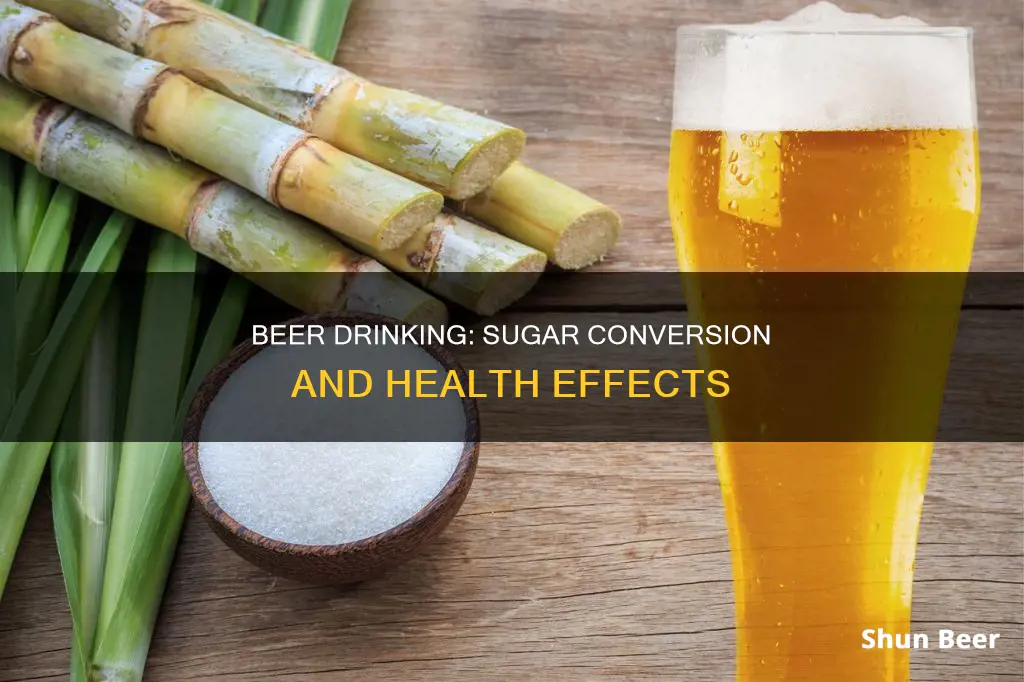
Alcohol is often associated with sugar, and it's not uncommon for people to wonder if drinking beer can turn into sugar in the body. This is a myth, and alcohol does not metabolise into sugar. However, it's important to understand the relationship between alcohol and sugar, especially for individuals recovering from alcohol addiction. Alcohol can significantly impact blood sugar levels, causing them to rise initially and then drop dramatically. It increases insulin secretion and interferes with the liver's ability to release glucose, making heavy drinkers susceptible to hypoglycaemia. Additionally, alcoholic beverages like beer contain carbohydrates, which can increase blood glucose levels. Understanding how alcohol affects blood sugar is crucial, especially for people with health conditions like diabetes.
What You'll Learn

Beer doesn't turn into sugar in the body
The liver is in charge of turning food into energy for our cells, usually in the form of glucose. However, alcohol has to be specially processed by the liver. Because the body considers alcohol a toxin, it gets priority in the processing line-up. So, when alcohol hits the bloodstream, the liver stops everything else to detoxify it.
This means that, depending on how much you drink, your liver could be occupied for several hours processing alcohol, all while your blood glucose levels continue to drop. This can lead to hunger and overconsumption of calories.
Beer does contain carbohydrates, which are absorbed into the bloodstream relatively quickly, leading to increased glucose levels. However, this is not the result of the beer turning into sugar in the body.
It's also worth noting that while beer doesn't turn into sugar, it does contain small amounts of sugar from the fermentation process of its raw ingredients. For example, wine is made with grapes that contain fruit sugars.
Beer and Swollen Ankles: Is There a Connection?
You may want to see also

Alcohol affects blood sugar levels
Beer, in particular, can influence blood glucose levels. It contains carbohydrates that are quickly absorbed into the bloodstream, leading to increased glucose levels. Drinking a lot of beer, however, can have the opposite effect, causing blood glucose levels to drop. This is because alcohol interferes with the liver's ability to release glucose into the bloodstream. The liver prioritises breaking down alcohol over releasing glucose, which can lead to hypoglycemia. This risk is multiplied with each additional drink.
The effects of alcohol on blood sugar levels can last up to 12 hours after the last drink. It's important to drink in moderation and only when blood sugar levels are well-managed. For men, this means no more than two drinks per day, and for women, no more than one. It's also recommended to drink alcohol with food, especially carbohydrates, to help stabilise blood sugar levels.
While alcohol does not turn into sugar in the body, it can affect blood sugar levels in multiple ways, increasing the risk of hypoglycemia and disrupting the body's ability to regulate blood sugar.
Beer and Ulcers: What You Need to Know
You may want to see also

Beer contains carbohydrates
Beer is made from grains such as barley and wheat, which contain carbohydrates. Beer also contains added sugars, which further increases its carbohydrate content. The number of grains and added sugars that remain in the beer depends on the fermentation process.
Dark beers tend to have more carbohydrates than light beers due to the way they are brewed with added malts. For example, a 12-ounce can of ale, lager, porter, premium beer, or stout contains more than 12 grams of carbohydrates, which is about four times the amount in a light beer.
The calorie count for a standard 12-ounce serving of one of the top 10 most popular beers in the United States ranges from around 95 calories on the low end to just under 150 calories on the high end. The amount of carbohydrates and calories in beer depends on the type of beer and how much you drink.
People watching their carbohydrate intake may want to limit their beer consumption. However, beer can be part of a healthy diet when consumed in moderation, which is often defined as no more than two drinks per day or 14 drinks per week for men, and no more than one drink per day or seven drinks per week for women.
Beer Tolerance: Why Some People Can't Get Drunk Easily
You may want to see also

Alcohol stimulates the appetite
Alcohol does not turn into sugar in the body. However, it does affect blood sugar levels, causing them to rise initially and then drop dramatically. Alcohol also increases insulin secretion and prevents the liver from releasing glucose, which can lead to hypoglycaemia.
Alcohol has been found to stimulate the appetite, which can lead to overeating. This effect has been observed in animal studies, where alcohol activated neurons that are usually fired when the body experiences starvation. This suggests that the body is tricked into thinking it is hungry when it is actually receiving a lot of calories from the alcohol.
In humans, this can lead to increased energy intake, as observed in several studies. One explanation for this is that alcohol lowers inhibitions and decreases defences when it comes to portion control and making healthy choices. Alcohol can also influence hormones that affect feelings of fullness, such as leptin and glucagon-like peptide-1.
Additionally, alcohol can lower blood sugar, leading to cravings for sugar and carbs. This can be especially risky for people with diabetes, who are at a higher risk of experiencing low blood sugar when consuming alcohol.
Overall, while alcohol does not turn into sugar, it can impact the body's ability to regulate blood sugar and stimulate the appetite, leading to potential health risks.
- Drink with a balanced meal that includes whole grains, complex carbohydrates, healthy fats, and protein.
- Avoid keeping unhealthy snacks around when drinking.
- Make healthier options more accessible, such as hummus with chopped vegetables, fruit, or air-popped popcorn.
- Stay hydrated by drinking water instead of reaching for another alcoholic beverage.
Beer and Teeth Whitening: What You Need to Know
You may want to see also

Alcohol and mixers contain sugar
Alcohol and mixers contain varying levels of sugar. Beer, for example, is fermented dry and contains no sugar. However, it has a high carbohydrate content, which the body converts to sugar. Wine, on the other hand, does contain small amounts of sugar due to the fermentation process of the raw ingredients used to make it. For instance, a 5-ounce glass of red wine typically has about 1 gram of sugar, while the same amount of white wine has about 1.4 grams.
Hard cider is also noteworthy for its high sugar content, with common brands containing 15 to 25 grams of sugar per 12-ounce can. When it comes to spirits like whiskey, vodka, gin, and tequila, they typically do not contain any sugar. However, the mixers used in cocktails can be loaded with sugar. For instance, cranberry juice, regular soda, and even tonic water contain high levels of sugar.
The sugar content in alcoholic beverages can have a significant impact on blood sugar levels. Alcohol prevents the liver from producing glucose, which can lead to hypoglycemia after a night of drinking. This is especially important for people with diabetes, who are often advised to eat something when drinking to compensate for the expected drop in blood sugar levels. Additionally, alcohol can affect the hormones that regulate blood sugar levels, leading to disruptions in glucose production in the liver and contributing to low blood sugar.
It is worth noting that the effect of alcohol on blood sugar levels can vary from person to person, so testing blood sugar levels before, during, and after drinking can provide valuable insights into how different drinks affect an individual's sugar levels.
Beer on The Ranch: Was It Real?
You may want to see also
Frequently asked questions
No, beer does not turn into sugar in the body. In fact, alcohol lowers blood sugar levels.
Yes, beer does contain sugar. The sugar in beer is created during fermentation, which converts the sugars from malted grains into alcohol.
Beer's sugar content is generally very low. However, non-alcoholic beers have the highest sugar content of all beers.







